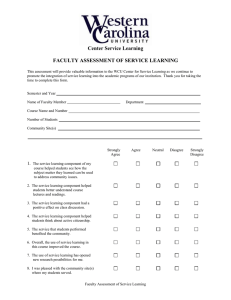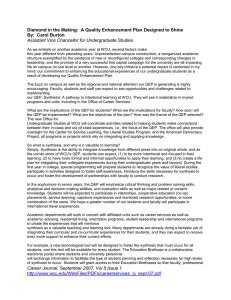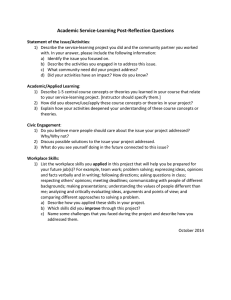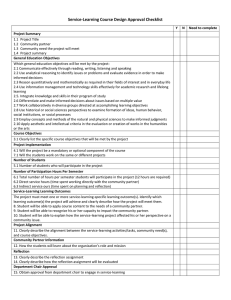How Service Learning Fosters Synthesis and Prepares Students for Careers
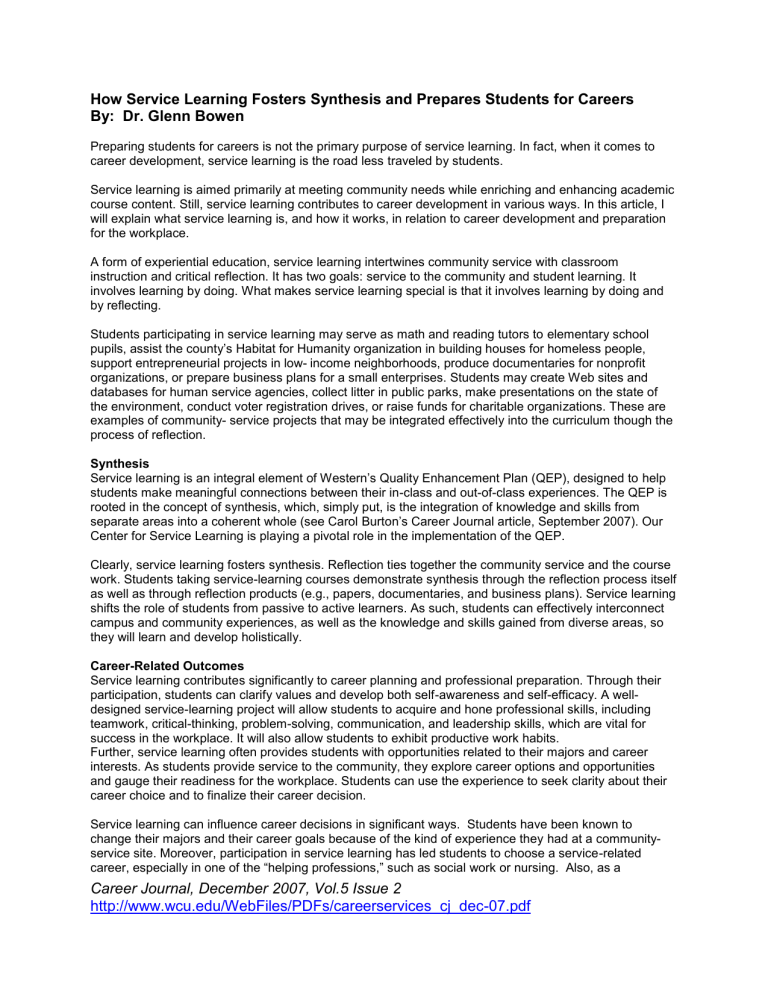
How Service Learning Fosters Synthesis and Prepares Students for Careers
By: Dr. Glenn Bowen
Preparing students for careers is not the primary purpose of service learning. In fact, when it comes to career development, service learning is the road less traveled by students.
Service learning is aimed primarily at meeting community needs while enriching and enhancing academic course content. Still, service learning contributes to career development in various ways. In this article, I will explain what service learning is, and how it works, in relation to career development and preparation for the workplace.
A form of experiential education, service learning intertwines community service with classroom instruction and critical reflection. It has two goals: service to the community and student learning. It involves learning by doing. What makes service learning special is that it involves learning by doing and by reflecting.
Students participating in service learning may serve as math and reading tutors to elementary school pupils, assist the county’s Habitat for Humanity organization in building houses for homeless people, support entrepreneurial projects in lowincome neighborhoods, produce documentaries for nonprofit organizations, or prepare business plans for a small enterprises. Students may create Web sites and databases for human service agencies, collect litter in public parks, make presentations on the state of the environment, conduct voter registration drives, or raise funds for charitable organizations. These are examples of community- service projects that may be integrated effectively into the curriculum though the process of reflection.
Synthesis
Service learning is an integral element of Western’s Quality Enhancement Plan (QEP), designed to help students make meaningful connections between their in-class and out-of-class experiences. The QEP is rooted in the concept of synthesis, which, simply put, is the integration of knowledge and skills from separate areas into a coherent whole (see Carol Burton’s Career Journal article, September 2007). Our
Center for Service Learning is playing a pivotal role in the implementation of the QEP.
Clearly, service learning fosters synthesis. Reflection ties together the community service and the course work. Students taking service-learning courses demonstrate synthesis through the reflection process itself as well as through reflection products (e.g., papers, documentaries, and business plans). Service learning shifts the role of students from passive to active learners. As such, students can effectively interconnect campus and community experiences, as well as the knowledge and skills gained from diverse areas, so they will learn and develop holistically.
Career-Related Outcomes
Service learning contributes significantly to career planning and professional preparation. Through their participation, students can clarify values and develop both self-awareness and self-efficacy. A welldesigned service-learning project will allow students to acquire and hone professional skills, including teamwork, critical-thinking, problem-solving, communication, and leadership skills, which are vital for success in the workplace. It will also allow students to exhibit productive work habits.
Further, service learning often provides students with opportunities related to their majors and career interests. As students provide service to the community, they explore career options and opportunities and gauge their readiness for the workplace. Students can use the experience to seek clarity about their career choice and to finalize their career decision.
Service learning can influence career decisions in significant ways. Students have been known to change their majors and their career goals because of the kind of experience they had at a community- service site. Moreover, participation in service learning has led students to choose a service-related career, especially in one of the “helping professions,” such as social work or nursing. Also, as a
Career Journal, December 2007, Vol.5 Issue 2
http://www.wcu.edu/WebFiles/PDFs/careerservices_cj_dec-07.pdf
consequence of their community-service experiences, some students choose a career through which they can contribute specifically to the pursuit of social justice.
Students know that community service can help them get their foot in the door at a place where they would like to work. They know that community service provides new contacts and new opportunities. To be sure, more than a few have reported that they landed their first real job at the place where they did community service. Indeed, getting to know people in the community and in the workplace will yield higher returns than sending out scores of job application letters and résumés.
In career-focused service-learning classes, students should be required to articulate their career choices based on an assessment of their interests, abilities, and experiences. They should be expected to make strong connections between classroom and community based learning and to document knowledge and skills gained through service learning. Additionally, they should be expected to express a clear understanding of the complex world of work and to articulate the characteristics of a preferred work environment.
Service learning provides motivations for choosing a career and can enhance the career development process. It helps students gain marketable experience and a competitive edge. To ensure that it does, faculty and students should carefully design or select the service projects and service sites. This does not mean that a nursing student, for example, must serve in a hospital or nursing home (A school or community center may be an appropriate site for the nursing student.). What it means is that the service projects and sites should facilitate the achievement of both the service goals and the learning goals specified in the syllabus.
The community-service assignments – for upper-class students, in particular – should allow them to explore careers, develop job-related knowledge and skills, and ultimately make the transition from college to work. Accordingly, faculty should ensure that students examine their service experiences in relation to the course content and classroom instruction. For their part, students should seek the most that they can get from service learning and, in the process, become active agents in their own career development.
In the final analysis, students should engage in community service, use the service to enrich their learning, and use what they learn to make wise career decisions. They will then graduate as active citizens prepared not only to make a living in the workplace but also to make a difference in the community.
Career Journal, December 2007, Vol.5 Issue 2
http://www.wcu.edu/WebFiles/PDFs/careerservices_cj_dec-07.pdf
